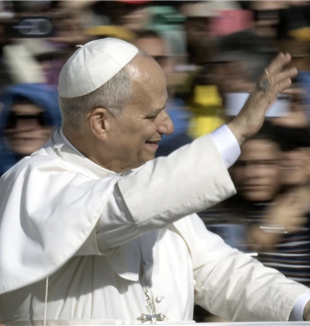
“Who am I?”: a Question that Challenges Education
The words of Pope Leo XIV at the Jubilee of the world of education and in his first Apostolic Letter, Drawing New Maps of Hope, “not only call our educational proposals into question but also challenge our personal experience.”On Friday afternoon, October 31, during a discussion about school experiences, a third-year high school student spoke enthusiastically about her encounter with the early philosophers: “Those questions about the origin and destiny of everything are also mine, but when I expressed my enthusiasm, my teacher corrected me: for him, this is a scientific study that has nothing to do with me personally.” A senior student replied: “As a member of the youth jury at a film festival, I shared with my peers our appreciation for a film that addressed exactly those existential questions you mentioned, but the adults present encouraged us to focus our attention on other factors instead: acting, editing, photography...”
It is striking and painful how often we adults, even with the best of intentions (such as precision in teaching), contribute to extinguishing the fire that burns in the hearts of the young people entrusted to us, instead of rekindling it. Perhaps it is because that fire scares us, confronting us with uncomfortable questions – questions that we think we have ‘solved’ and do not want to reopen. This is why it is such a precious resource that a former mathematics and physics teacher is now Pope, who urges us to “emerge from the shallows” of a rationalistic, ‘cold’ approach and to recover “an empathic and open vision, and to understand better how humankind understands itself today in order to develop and deepen our teaching.” The question that can never be left unanswered is the big question: Who am I? “This is why desire and the heart must not be separated from knowledge: it would mean splitting the person” (Apostolic Letter Drawing New Maps of Hope, 3.1). On the contrary, education is an encounter between living experiences, involving reason – as the capacity for inquiry and discernment – and the heart, that is, the place of primary needs for truth, beauty, justice, and happiness. The paradigm is precisely that outlined by St. John Henry Newman – declared co-patron of the Church’s educational mission – in his cardinal motto: cor ad cor loquitur, heart speaks to heart.
Leo XIV invites us on a journey of knowledge in which we are never seen as having ‘reached the destination’: “Teachers and pupils walk together. They are aware that they are not searching in vain, and at the same time know that they must continue searching even after having made discoveries.” These words were spoken during the meeting with educators in St. Peter's Square on Friday morning, just a few hours before the dialogue with the students I mentioned earlier, and they echo what he said in his first Apostolic Letter: “Christian education is a collective endeavour: no one educates alone. The educational community is a ‘we’ where teachers, students, families, administrative and service staff, pastors and civil society converge to generate life. This ‘we’ prevents water from stagnating in the swamp of ‘it has always been done this way’ and forces it to flow, to nourish, to irrigate” (3.1).
These words not only call our educational proposals into question but also challenge our personal experience. Indeed, there are two conditions necessary for water not to stagnate: there must be a source from which it continues to flow, and there must also be banks to prevent the current from dispersing, allowing it to reach the sea. These banks are, on the one hand, that ‘we,’ that is, the community within which I grow by listening and observing, and on the other hand, the great question of meaning that becomes prayer. Within these banks, we become fathers because we recognize ourselves as children, never as orphans, as Fr. Giussani said: “No one generates unless they are generated.” The educator is not merely a dispenser of knowledge and instruction, but, above all, is a person who always needs to learn, to be corrected as well as to correct, and this only happens within a personal journey shared with others, as the Pontiff stated in his meeting with students: “Education brings people together into lively communities and organizes ideas into constellations of meaning.”
In these times of great confusion, uncertainty, and therefore mistrust, where relationships between people and states seem increasingly strained, the Holy Father reminds us that “educating is an act of hope” (3.2). It is no coincidence that he dedicated his first Apostolic Letter precisely to education, and in particular to Catholic education. As a teacher and rector of a Catholic-inspired private school, I believe that the principles he outlines in the Letter (including the centrality of the person, the alliance between school and family, the involvement of the state according to the principle of subsidiarity, the care of interiority and a harmonious relationship with technology, attention to a language of “unarmed and disarming” peace) constitute valuable points of reference for navigating the open seas we are now called to undertake. We should be grateful because we have a father who does not leave us without a compass.